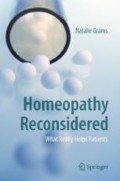Abstract
It’s strange to observe that homeopathy is still very much in demand despite the considerable shortcomings that have been pointed out. In August 2014 Amazon listed 17,107 books on homeopathy.
Access this chapter
Tax calculation will be finalised at checkout
Purchases are for personal use only
Notes
- 1.
- 2.
In the homeopathic sense, the so-called modalities also belong to the physical level. Modalities are defined as criteria that influence or are related to physical complaints, for example: Which influences cause improvement or worsening? Is there a characteristic (daily) course of symptoms or other anomalies? Modalities are usually somewhat more individualised than the mere facts, sometimes also specific to a certain homeopathic patient and drug image. In scientific medicine, modalities don't play such an important role.
- 3.
- 4.
This is one of many possible positions in a wealth of (para-)scientific, psychological, and philosophical considerations. I have decided in favour of this position for pragmatic reasons, because the explanations discussed later as to why homeopathy may have real effects can be built upon it.
- 5.
Richard M. Haehl 1873–1932 MD, a German orthodox physician who converted to homeopathy, studied at the Hahnemann College of Philadelphia, and wrote a biography of Samuel Hahnemann.
- 6.
Paracelsus (1493/4–1541), born Theophrastus von Hohenheim, Swiss physician, alchemist, and astrologer, pioneered several aspects of the Renaissance "medical revolution".
- 7.
Even the coffee abstinence which is often demanded during homeopathic treatment (for reasons that are no longer comprehensible today) can be put to rest by the level model. For how could coffee, for example, interfere with the awareness of a core spiritual problem? The fact that it makes sense in general to pay attention to overuse of stimulants speaks for itself and for a healthy mind.
- 8.
References
Fromm E (1989) Gesamtausgabe in 10 Bänden. Ed. Rainer Funk. Deutscher Taschenbuch Verlag, München (in German) – see also: Erich Fromm online, Index of works and E-Publications, also in English http://fromm-online.org/en/werke-von-erich-fromm/
Gendlin E (1978) Focusing. Everest House, London
Grabia S, Ernst E (2003) Homeopathic aggravations: a systematic review of randomised, placebo-controlled clinical trials. Homeopathy 92 (2):92–98. https://www.sciencedirect.com/science/article/pii/S1475491603000079?via%3Dihub. Accessed 20 Jan 2018
Hahnemann S (1997) Organon of medicine, 6th edn (Translation Boericke). http://www.homeopathyhome.com/reference/organon/organon.html. Accessed 20 April 2018
Hahnemann S (2016) The chronic diseases; their specific nature and homeopathic treatment. Leopold Classic Library, Victoria AU
Koerfer A et al (2008) Training und Prüfung kommunikativer Kompetenz. Aus- und Fortbildungskonzepte zur ärztlichen Gesprächsführung. (Training and testing of communicative competence. Basic and advanced training concepts for conducting medical conversations). http://www.gespraechsforschung-ozs.de/heft2008/heft2008.html. Accessed 12 April 2017
Kohnen N (2007) Kulturphänomene: Die Botschaft hinter den Symptomen. Umgang mit fremdländischen Patienten (Cultural phenomena: The message behind the symptoms. Dealing with foreign patients). Hautnah Dermatologie 1:20–23 (in German)
Metzinger T (2013) Spiritualität und intellektuelle Redlichkeit. Ein Versuch. (Spirituality and intellectual honesty. An attempt). Selbstverlag, Mainz (in German) http://www.philosophie.uni-mainz.de/Dateien/Metzinger_SIR_2013.pdf. Accessed 18 April 2018
Mitscherlich A (1974) Krankheit als Konflikt. Studien zur psychosomatischen Medizin. (Disease as conflict. Studies in psychosomatic medicine.) Edition Suhrkamp, Frankfurt/Main (in German) – see also: The Oxford Handbook of Health Psychology, Chapters “From Pathology as Psychic Conflict to the Specifity of the Symptom” and “Expression of the Emotions and Illness”. Oxford University Press, USA
Nowak P (2010) Das Gespräch zwischen Arzt und Patient: Zentraler Ansatzpunkt oder Stolperstein für ein “gesundes” Gesundheitswesen? (The conversation between doctor and patient: central starting point or stumbling block for a “healthy” health care system?) (in German) www.patientenanwalt.com/download/Expertenletter/Patient/Das_Gespraech_zwischen_Arzt_und_Patient_Dr_Peter_Nowak_Expertenletter_Patient.pdf.pdf. Accessed 29 Mar 2018
Precht RD (2007) Who am i and if so how many? A journey through your mind. Constable, 1st edn (2011)
Rogers CA (1942) Counselling and psychotherapy. Houghton Mifflin Company, Boston, S. 123. https://archive.org/stream/counselingandpsy029048mbp#page/n147/mode/2up/search/conflicts+of+the+individual. Accessed 28 Mar 2018
Sankaran R (2003) An insight into plants, vol. 1 (Anacardiaceae). Homeopathic Medical Publishers, Mumbai
Sankaran R (2005) Sensation refined. Homeopathic Medical Publishers, Mumbai
Sankaran R (2009) The other song. Homeopathic Medical Publishers, Mumbai
Schmidt-Salomon M (2014) Hoffnung Mensch. Eine bessere Welt ist möglich. (Hope on man. A better world is possible). 2nd edn. Piper, München (in German)
Shang A, Egger M, et al (2005) Are the clinical effects of homeopathy placebo effects? Comparative study of placebo-controlled trials of homeopathy and allopathy. Lancet 366(9487):726–732
The Lancet: the end of homeopathy (2005) The Lancet:366(9487):690, 27 August 2005 DOI:https://doi.org/10.1016/S0140-6736(05)67149-8
von Uexküll T (1997) Psychosomatic medicine. Lippincott Williams and Wilkins, Philadelphia
Weymayr C, Heißmann N (2012) Die Homöopathie-Lüge: So gefährlich ist die Lehre von den weißen Kügelchen. (The homeopathic lie: that’s how dangerous the theory of the white globules is). Piper, München (in German)
Author information
Authors and Affiliations
Rights and permissions
Copyright information
© 2019 Springer Nature Switzerland AG
About this chapter
Cite this chapter
Grams, N. (2019). Why Do Patients Turn to Homeopathy?. In: Homeopathy Reconsidered. Copernicus, Cham. https://doi.org/10.1007/978-3-030-00509-2_4
Download citation
DOI: https://doi.org/10.1007/978-3-030-00509-2_4
Published:
Publisher Name: Copernicus, Cham
Print ISBN: 978-3-030-00508-5
Online ISBN: 978-3-030-00509-2
eBook Packages: MedicineMedicine (R0)

